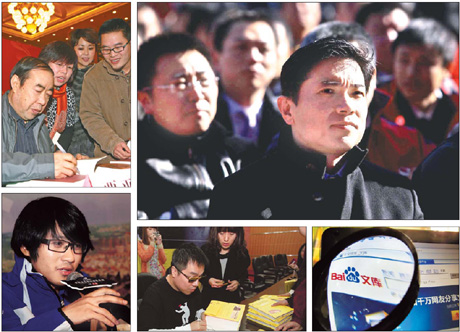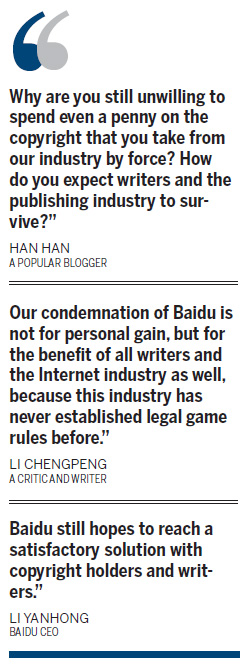Society
War of the words over online piracy
Updated: 2011-03-30 07:08
By Qiu Bo, Duan Yan and Li Li (China Daily)
Writers face uphill struggle to prove copyright infringement, report Qiu Bo, Duan Yan and Li Li in Beijing.
Huang Shan mechanically switches on a palm-size gadget as the subway train's door shuts. Ghost Fighter, Chapter Two. Another 40-minute journey to work, and a horror story is the best way to kill time.
"The electronic book is my favorite travel companion," said Huang, 27, an English teacher at a Beijing language training school. "I download e-books from the Internet for free."
 About 50 writers and publishers are fighting search engine giant Baidu over its use of their works without permission through the online library Baidu Wenku. Those who signed an open letter of complaint include novelist Jia Pingwa (top left), blogger Han Han (bottom left) and Hong Kong movie director Pang Ho-cheung (bottom center, seated). Baidu's chief executive, Li Yanghong (top right) said he hopes to work out a mutually beneficial settlement. Provided to China Daily |
Huang's free ride could end soon, amid increasing battles between copyright holders and content-providing websites. Digital piracy, after already extracting a heavy toll from the film, music and software industries, now has publishing in its crosshairs.
The latest row is between Baidu and a group of about 50 Chinese writers and publishers, including popular blogger Han Han, novelist Jia Pingwa and Hong Kong movie director Pang Ho-cheung.
The literary group signed and published a letter on March 15 claiming that the largest Chinese search engine provided their works for free download from its library, Baidu Wenku, without their permission.
|
|
The two sides negotiated on Thursday, but the talks broke down after 4.5 hours.
Baidu issued a statement on Saturday, apologizing for hurting "the feelings of some writers". It also promised to delete all rights-infringing materials over the following three days. The number of literary worksin thelibrarydropped from2.8million before negotiations to 168 late Tuesday afternoon.
Shen Haobo, a publisher and one of the writers' representatives, told China Daily on Sunday that the writers refused to accept Baidu's apology because it did not admit the site had engaged in piracy.
Han had complained Saturday on his blog, in an open letter to Baidu CEO Li Yanhong, because Baidu had refused to admit any act of copyright infringement and because writers generally earn very little for their works.
"Why are you still unwilling to spendevena pennyon the copyright that you take from our industry by force?" he wrote. "How do youexpectwriters and the publishing industry to survive?"
Forbes magazine listed Li this month as the richest man in China with a fortune of $9.4 billion. Record companies have taken Baidu to court over a similar issue, claiming copyright infringement over its mp3 search service that allows users to easily find and download music for free.
Baidu was listed last May as one of the world's most notorious piracy sites by the Congressional International Anti-Piracy Caucus, a watchdog group formed by 70 US lawmakers.
At an annual IT leaders summit in Shenzhen on Monday, Baidu's Li publicly responded for the first time to the dispute. He said he'd had many sleepless nights, and that the public misunderstands the company's actions. Li said Baidu is stepping up anti-piracy efforts and hopes to work out a mutually beneficial business model to settle the current issue.
He also mentioned the possibility of shutting down Baidu Wenku. "I made myself very clear inside the company. If we can't manage this, then we will shut it down."
Specials

Tea-ing up
More turning to Chinese tea for investment opportunities like vintage wine

A cut above
The ancient city of Luoyang is home to a treasure trove of cultural wonders.

Rise and shine
The Chinese solar energy industry is heating up following recent setbacks in the nuclear sector
